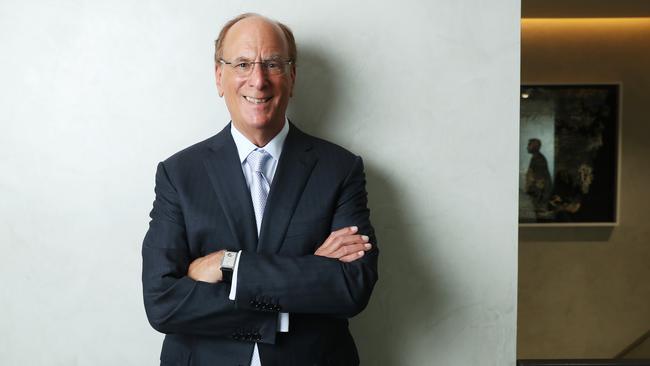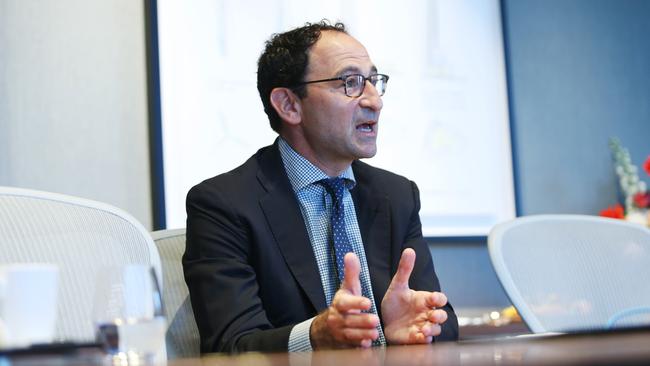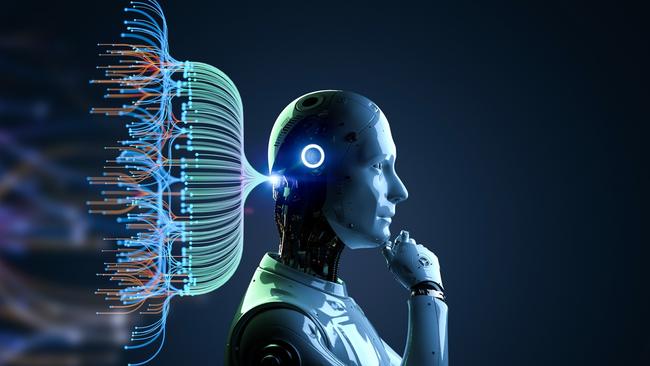
“The big issue we have is that we have not had any real technological transformation for years,” the co-founder of the $9 trillion investment powerhouse BlackRock says.
“Most people will tell you that the last time we had really revolutionised technology was 2008. That was the smartphone and the cloud, both 2008,” Fink tells The Weekend Australian.
“Think about it. Can you imagine your life without a smartphone? It has changed your life.”
Cloud technology, Fink adds, revolutionised computing at the back end around data management and digital storage.

Fink is in BlackRock’s Sydney office and the conversation soon turns to artificial intelligence. He sits on the side of opportunity when it comes to the technology that stands to up-end our lives in ways that are yet to be imagined.
But could it also be the very thing that Australia needs to solve some of its big economic challenges?
“If AI can reach the levels of our imagination just think what it could do. It will change how we work,” he says. “It would change our productivity. This could be the key that brings down inflation.
“We look at this as an opportunity, full of excitement and full of fear.”
Fear has gripped the headlines in recent months around AI with researchers and even tech executives warning innovations in recent AI models are posing new and unknown risks. The Albanese government last week released its own issues paper seeking to define the guardrails, and regulators around the world are grappling with the big issues.
But AI is already out of the box and is unlikely to be put back. And all big businesses here and around the world – from banks, retailers, healthcare and even miners – are actively looking at how the technology can be put to use.
The bigger impact could be reversing Australia’s decades slide in productivity rates, which is only irritating the current bout of red hot inflation.
Indeed, first quarter GDP figures released this week, show the nation continues to go even further backwards on productivity and there is little that is being done to tackle it. Boosting productivity can boost national wealth and help keep inflation in check.
Commonwealth Bank last month highlighted how it is using technology to help its frontline staff better answer complicated financial questions. Retailers too are already using it in their display and recommendation results in an effort to boost sales.
AI seems to have emerged suddenly; indeed ChatGPT was only launched last November. But the breakthrough in the technology, which is being pursued by every tech major from Amazon, Google, Facebook to Apple, has been the result of a rich melting pot of factors.
Years of ultra-low interest rates had meant that billions of dollars were easily and freely flowing into tech research. Advances were also being made in hardware in terms of adding horsepower to microchips and high-speed cloud computing.

Blackstone’s global president, Jon Gray, expects AI to be disruptive as it continues to evolve. “This is a seismic shift to economies,” said the New York-based Gray, who oversees an investment portfolio worth $US1 trillion.
“Ultimately it will be positive in terms of productivity. But there will be winners and losers. There will be businesses that get disintermediated, that the machines can do something more efficiently, lower costs, but then they will enhance other businesses as well,” he tells The Weekend Australian.
Gray is making big bets around technology infrastructure, such as data centres which deliver computing power that’s associated with AI. He is also putting pressure on his executives to consider how AI can improve the operations of the hundreds of companies that Blackstone backs as a private equity investor.
During the week Zack Kass, a top executive with Silicon Valley-based OpenAI, spoke at a closed session during Morgan Stanley investment conference in Sydney. OpenAI, which is backed by Microsoft, is the developer of the ChatGPT application. This tool put the power of AI in the hands of anyone – not just researchers or big business.
The Weekend Australian and other media were not granted access to the session but according to one fund manager who sat in and took notes on the session, Kass told the audience the tech industry had also been taken by surprise just how quickly the technology has accelerated in a short period of time.

Kass, who is the go-to-market lead at OpenAI, also felt that the momentum and more breakthroughs would continue in quick succession.
Kass reportedly told the session the next few months will see new ground around 3D vision and video for AI. Then over the next six to 12 months AI technology would be quickly rolled out through business.
And this is where the compliance and regulation issues are likely to emerge.
Beyond two years is where AI will start being felt through the economy in both good and negative ways. This will be across job creation and as well a jump in productivity per worker. There will be job dislocation and a decline of some industries, Kass reportedly told the session.
On Friday Richard White, the multibillionaire founder of Australian software group WiseTech Global, told The Australian’s Economic Outlook forum in Sydney that he already is using AI as a helpful adjunct to what you do – such as for research.
The other reason for using it, White says, is because you have to live by example.
“You have to dig in and understand what it’s really about before you can actually make a sensible answer on an issue,” he says.
People are scared about some of this. They don’t understand how it’s moving. It’s moving really quickly. But I think it’s a nice moment. It is going to make a change.”




The world’s most influential investor, Larry Fink, leans forward and picks up his iPhone from the desk and holds it in front of him.